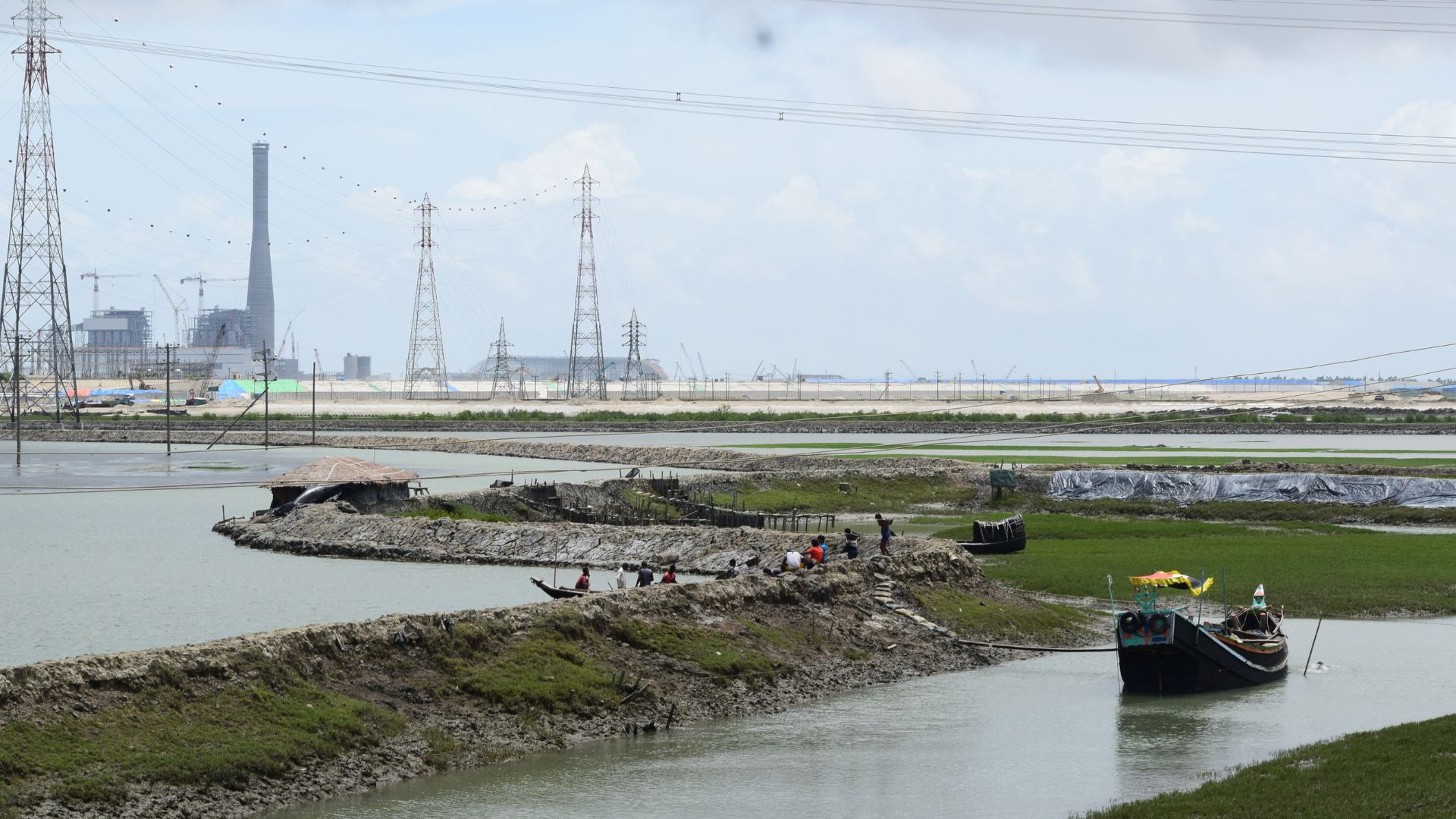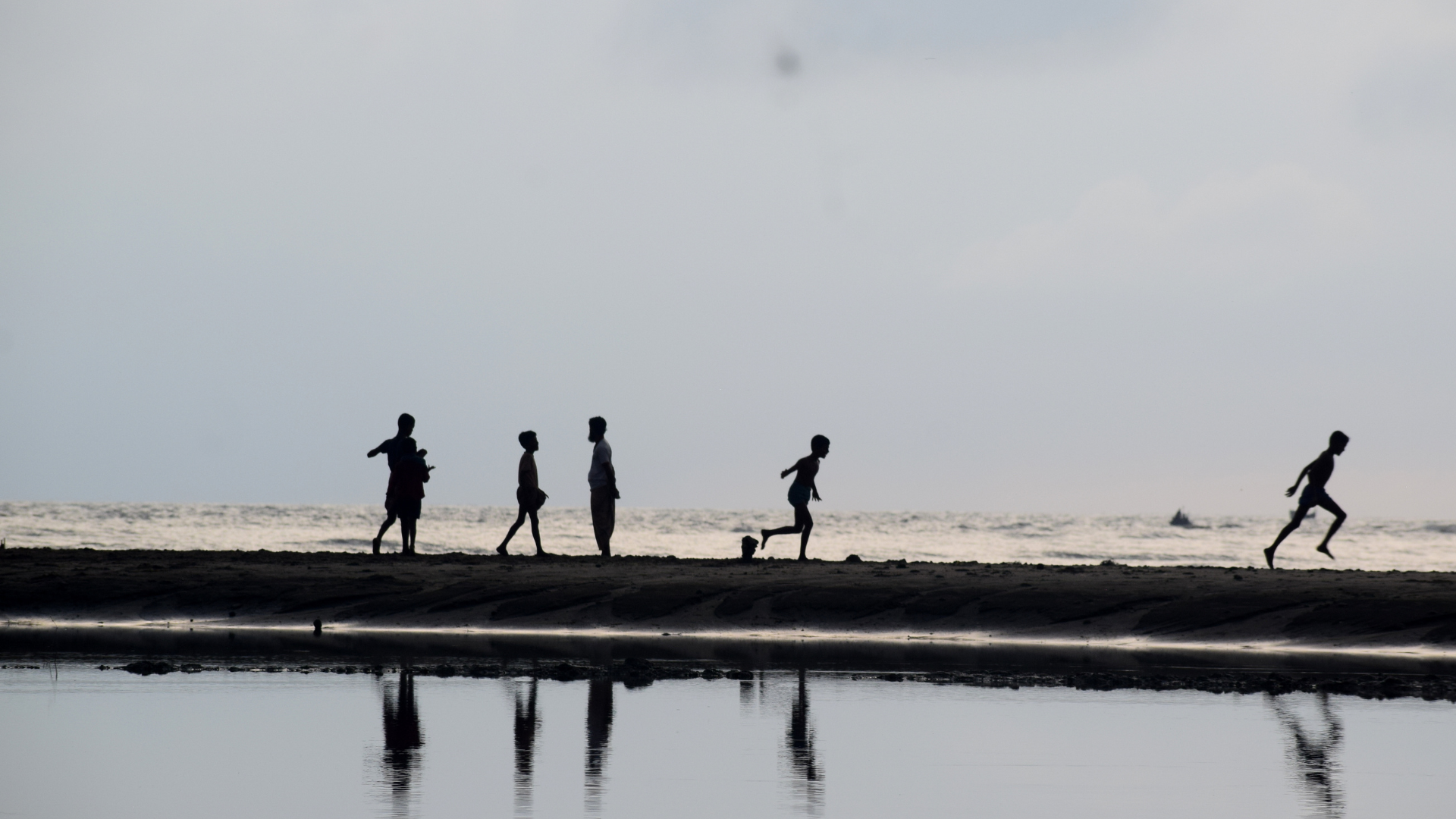350 Asia
MATARBARI, BANGLADESH
Empty Promises and The Fight for Justice
Locals evicted by the Matarbari Power Plant are still left in the lurch.
This story is part of the investigative storytelling project, Connecting The Dots, which follows fossil fuel finance in Asia.
Read More

Afsari Begum* had better days before 2014. Residing in the southern Bangladesh village of Matarbari, her husband and son had a steady-enough income to make ends meet for their family of five.
Then, in August 2014, they were promised a prosperous future. The government was acquiring “the lone source of the family’s income” — the salt field — in order to build a coal-based power plant.
With the land devoured by the power plant, both her family’s breadwinners turned into rickshaw pullers in the port city of Chattogram, 160 kilometers north of Matarbari. However, her husband, in his 60s, could not continue this backbreaking profession as his health was deteriorating. He succumbed to his illness and died a few months ago.
Six years after the acquisition of the land, the family has been socio-economically devastated. Now a bleak, uncertain future looms large for Afsari Begum.
“Had my husband been with my family and in the same profession, I would never have lost him. We were a happy family. They assured us of prosperity at the time of taking our land, now we are down and out”, she said.
The government acquired a total of 2,820 acres of land for the power plant, the construction of which is nearing an end, affecting the livelihoods of 20,000 people who relied on salt, fish, crab, and shrimp farming in Matarbari village for their income.
Coal Power Generation Company Bangladesh Limited Bangladesh (CPGCBL) and JICA (Japan International Cooperation Agency) officials assured the locals of training to make them a skilled workforce so that they could qualify themselves for jobs in power plants. This promise, like other commitments, remains elusive.
Take the example of Abdul Jobbar, one of the 44 displaced locals in the acquisition process, who has still been holding out hope of a home promised by government officials six years ago.
“I lost my home and my land to the power plant. I lost my identity by losing my home and land to the plant. My decent family life has been torn apart by the betrayal of the authorities.
Now I live in a rented home costing me $50 a month. My two children dropped out of school as I failed to finance their education. “
*Name has been changed to protect the individual.

Fight for Justice
Dissatisfied locals formed an organization to press home the need for rehabilitation of those affected by the coal-based power plant titled “Platform to Safeguard Landless People, Life, and Livelihood”.
Mohammad Mohsin, convener of the platform, said that those displaced were supposed to be relocated and rehabilitated within six months of their displacement. Out of 44 families, 36 were rehabilitated. Eight families are still uncertain of when they will have a roof over their heads.
They were told the hilly island would become as rich as Singapore, but CPGCBL and JICA did not keep their word. Now the land is destroyed, people are displaced, and their means of livelihood are obliterated.
The damage is multifaceted. The Kuhelia River, on which the fishing community relied to make their living, was earth-filled by the Roads and Highway Department to build an approach road to the power plant. During the preparation of land for the construction of the power plant, canals were clogged up blocking the water flow into the sea, engendering flood during monsoon.
“The 36 homes allotted to the locals are low in quality. The structure would break apart in any major cyclone, which is a common phenomenon on the island.
The officials were delaying the allotment of the homes. We held human chains, and sit-in programs for the last five years to make it happen”, Mohsin added.
Mohsin could remember people from every household being assured of training for a job in the power plant. However, the power plant authority brought laborers from outside the community instead of turning the locals into a skilled workforce.
50 year-old Jalil Mia, who had to leave his fishing profession, said they protested the earth-filling of the river. Today, they still demand the government restore the river to its previous status and give back their life and livelihood.
“We did not seek any mercy. All we want is justice”, Jalil added.

Earth-filling the Only River
The Department of Environment, according to an investigation, found the road built to facilitate communication to the power plant earth-filled around 26 acres of river, choking it up and narrowing it into a drain.
ActionAid, a non-government organization, said in its report that the sediment of the power plant blocked the drainage system and silting of the Kuhelia River.
Between 2016 to 2018, 22 villages on three occasions were flooded as the central canal and eight sluice gates were blocked, adding that 10,000 locals bore the brunt of the flood that lasted for weeks.
Abu Bakkar, secretary of the “Kuhelia River Protection Committee” said the river used to serve 100,000 people as a safe path of transporting goods. Salt produced in Mohekhali used to be shipped using the river route. Thousands of fishermen used to earn a livelihood fishing from the river.
“Now everything is in the past”, Bakkar said, voicing frustration.
“They did not leave any stone unturned — from holding protests, to having a dialogue with elected local representatives and officials, everything went unheard.
Many people moved away, leaving their families behind to sustain themselves, disrupting the social and domestic fabric”, he said.
Mohammad Mohsin, who is leading the platform to safeguard life and livelihood, reported incidents of intimidation. Those trying to speak out against the deprivation and betrayal of authority are being silenced either by law enforcers or local goons.
Matarbari is now a highly surveilled area, locals have said.
“They threaten that they will sue, arrest, or make us suffer in legal tangles to gag our voices. But we are not giving up. This is the question of existence. We can’t be uprooted this way”, Mohsin continued.
The outlay for Matarbari Power Plant increased, now standing at $ 5.8 billion, with JICA providing $4.3 billion. The project was set to be completed in 2023, but after revision, it is expected to be completed in 2026.
*Name has been changed to protect the individual.
Sign Up
Connecting the Dots
Get the full hi-resolution copy of the Connecting the Dots e-book by signing up. We will update you with information about this and upcoming projects, and opportunities to take action. Be part of our growing movement in Asia.
Sign up to learn more and receive updates about this project.


